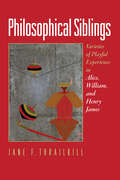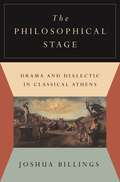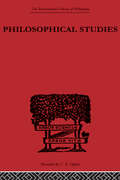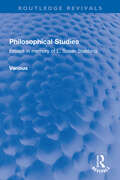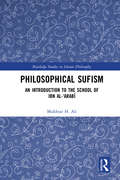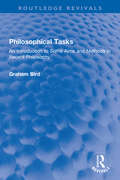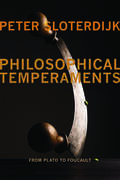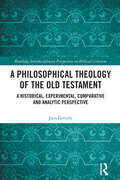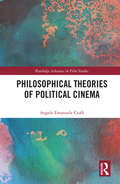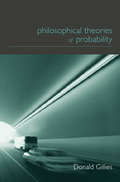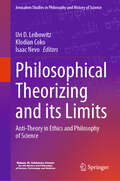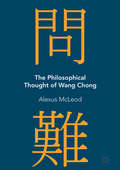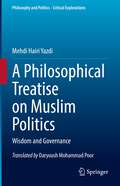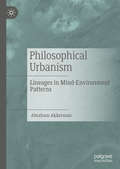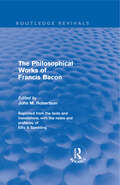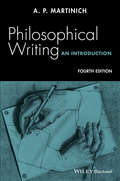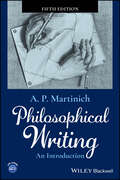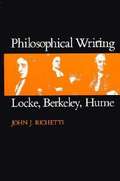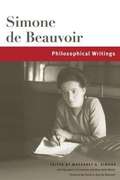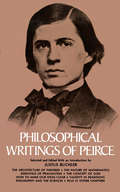- Table View
- List View
Philosophical Siblings: Varieties of Playful Experience in Alice, William, and Henry James
by Jane F. ThrailkillAlice James: an exemplary nineteenth-century neurasthenic and diarist. William James: a foundational figure for American psychology and philosophy. Henry James: a preeminent author and literary critic. These three iconic figures of nineteenth-century American culture and letters were also siblings, children of the storied James family, yet the diarist, the psychologist, and the novelist have seemed to occupy distinct realms of cultural authority and to speak to different audiences (or, in the case of Alice, to no audience at all). Their writings have rarely been considered together.In Philosophical Siblings Jane F. Thrailkill asks what new story is illuminated when we study their writings collectively. By approaching the Jameses as intimate thinkers operating on a common field of play, Thrailkill reveals the siblings' shared project—part psychological, part philosophical—of showing how minds meet in a world teeming with possibilities and risks. Scientists in nineteenth-century psychology labs were studying isolated individuals, tracking eye movements, and timing reactions to better understand the human machine. In contrast, the Jameses' models for discovery were philosophical toys: ludic devices that light up quirks of perception and are devilishly fun as well. With childlike humor, the siblings' intellectual playfulness is both message and medium, manifested in an expressive style that exploits incongruity, delights in absurdities, and sometimes, teasingly, inflicts the sting of critique.Most important, the Jameses' writings model how human beings accomplish high-wire acts of perception and creation. Alice, William, and Henry James did not merely present a new, interactive theory of mind; they dramatized it in their writings as a curiosity-based practice. Philosophical Siblings accepts their invitation to mindful play and offers a fresh way of thinking about literary encounters more generally, one that approaches even the weightiest texts with serious lightness.
The Philosophical Stage: Drama and Dialectic in Classical Athens
by Joshua BillingsA bold new reconception of ancient Greek drama as a mode of philosophical thinkingThe Philosophical Stage offers an innovative approach to ancient Greek literature and thought that places drama at the heart of intellectual history. Drawing on evidence from tragedy and comedy, Joshua Billings shines new light on the development of early Greek philosophy, arguing that drama is our best source for understanding the intellectual culture of classical Athens.In this incisive book, Billings recasts classical Greek intellectual history as a conversation across discourses and demonstrates the significance of dramatic reflections on widely shared theoretical questions. He argues that neither "literature" nor "philosophy" was a defined category in the fifth century BCE, and develops a method of reading dramatic form as a structured investigation of issues at the heart of the emerging discipline of philosophy.A breathtaking work of intellectual history by one of today&’s most original classical scholars, The Philosophical Stage presents a novel approach to ancient drama and sets a path for a renewed understanding of early Greek thought.
Philosophical Studies (International Library of Philosophy)
by G.E. MooreFirst published in 2000. Routledge is an imprint of Taylor & Francis, an informa company.
Philosophical Studies: Essays in memory of L. Susan Stebbing (Routledge Revivals)
by VariousFirst published in 1948, Philosophical Studies presents a collection of essays written by friends and colleagues of Professor L. Susan Stebbing in the Aristotelian Society. Most of these essays do not bear directly on Professor Stebbings’ work, but they deal with problems which she discussed time and again at the Society’s meetings. It explores themes like moral ends and means; reflections occasioned by ideals and illusions; reason in history; the logic of elucidation; logic and semantics; philosophy of nature; and epistemology and the ego-centric predicament. This book is a must read for students and scholars of Philosophy.
Philosophical Sufism: An Introduction to the School of Ibn al-'Arabi (Routledge Studies in Islamic Philosophy)
by Mukhtar H. AliAnalyzing the intersection between Sufism and philosophy, this volume is a sweeping examination of the mystical philosophy of Muḥyī-l-Dīn Ibn al-ʿArabī (d. 637/1240), one of the most influential and original thinkers of the Islamic world. This book systematically covers Ibn al-ʿArabī’s ontology, theology, epistemology, teleology, spiritual anthropology and eschatology. While philosophy uses deductive reasoning to discover the fundamental nature of existence and Sufism relies on spiritual experience, it was not until the school of Ibn al-ʿArabī that philosophy and Sufism converged into a single framework by elaborating spiritual doctrines in precise philosophical language. Contextualizing the historical development of Ibn al-ʿArabī’s school, the work draws from the earliest commentators of Ibn al-ʿArabī’s oeuvre, Ṣadr al-Dīn al-Qūnawī (d. 673/1274), ʿAbd al-Razzāq al-Kāshānī (d. ca. 730/1330) and Dawūd al-Qayṣarī (d. 751/1350), but also draws from the medieval heirs of his doctrines Sayyid Ḥaydar Āmulī (d. 787/1385), the pivotal intellectual and mystical figure of Persia who recast philosophical Sufism within the framework of Twelver Shīʿism and ʿAbd al-Raḥmān Jāmī (d. 898/1492), the key figure in the dissemination of Ibn al-ʿArabī’s ideas in the Persianate world as well as the Ottoman Empire, India, China and East Asia via Central Asia. Lucidly written and comprehensive in scope, with careful treatments of the key authors, Philosophical Sufism is a highly accessible introductory text for students and researchers interested in Islam, philosophy, religion and the Middle East.
Philosophical Tasks: An Introduction to Some Aims and Methods in Recent Philosophy (Routledge Revivals)
by Graham BirdFirst published in 1972, Philosophical Tasks was written to identify and examine some central themes in contemporary Anglo-American philosophy. The book explores the claim that philosophy is essentially linguistic, and considers in particular such topics as philosophy and science, fact and language, conceptual analysis, first- and second-order tasks, scepticism, ordinary language, and conceptual frameworks.
Philosophical Temperaments
by Thomas Dunlap Peter Sloterdijk Creston DavisPeter Sloterdijk turns his keen eye to the history of western thought, conducting colorful readings of the lives and ideas of the world's most influential intellectuals. Featuring nineteen vignettes rich in personal characterizations and theoretical analysis, Sloterdijk's companionable volume casts the development of philosophical thinking not as a buildup of compelling books and arguments but as a lifelong, intimate struggle with intellectual and spiritual movements, filled with as many pitfalls and derailments as transcendent breakthroughs.Sloterdijk delves into the work and times of Aristotle, Augustine, Bruno, Descartes, Foucault, Fichte, Hegel, Husserl, Kant, Kierkegaard, Leibniz, Marx, Nietzsche, Pascal, Plato, Sartre, Schelling, Schopenhauer, and Wittgenstein. He provocatively juxtaposes Plato against shamanism and Marx against Gnosticism, revealing both the vital external influences shaping these intellectuals' thought and the excitement and wonder generated by the application of their thinking in the real world. The philosophical "temperament" as conceived by Sloterdijk represents the uniquely creative encounter between the mind and a diverse array of cultures. It marks these philosophers' singular achievements and the special dynamic at play in philosophy as a whole. Creston Davis's introduction details Sloterdijk's own temperament, surveying the celebrated thinker's intellectual context, rhetorical style, and philosophical persona.
Philosophical Temperaments: From Plato to Foucault (Insurrections: Critical Studies in Religion, Politics, and Culture)
by Peter SloterdijkPeter Sloterdijk turns his keen eye to the history of western thought, conducting colorful readings of the lives and ideas of the world's most influential intellectuals. Featuring nineteen vignettes rich in personal characterizations and theoretical analysis, Sloterdijk's companionable volume casts the development of philosophical thinking not as a buildup of compelling books and arguments but as a lifelong, intimate struggle with intellectual and spiritual movements, filled with as many pitfalls and derailments as transcendent breakthroughs.Sloterdijk delves into the work and times of Aristotle, Augustine, Bruno, Descartes, Foucault, Fichte, Hegel, Husserl, Kant, Kierkegaard, Leibniz, Marx, Nietzsche, Pascal, Plato, Sartre, Schelling, Schopenhauer, and Wittgenstein. He provocatively juxtaposes Plato against shamanism and Marx against Gnosticism, revealing both the vital external influences shaping these intellectuals' thought and the excitement and wonder generated by the application of their thinking in the real world. The philosophical "temperament" as conceived by Sloterdijk represents the uniquely creative encounter between the mind and a diverse array of cultures. It marks these philosophers' singular achievements and the special dynamic at play in philosophy as a whole. Creston Davis's introduction details Sloterdijk's own temperament, surveying the celebrated thinker's intellectual context, rhetorical style, and philosophical persona.
A Philosophical Theology of the Old Testament: A historical, experimental, comparative and analytic perspective (Routledge Interdisciplinary Perspectives on Biblical Criticism)
by Jaco GerickeAre we able to identify and compare the philosophical perspectives and questions that must be postulated as having been somehow present in the language, ideas and worldviews of the Biblical authors? This book sets out an approach to something that has been generally considered impossible: a philosophical theology of the Old Testament. It demonstrates and addresses the neglect of a descriptive and comparative philosophical clarification of concepts in Old Testament theology, and in so doing treads new ground in Biblical studies and philosophical theology. Recognizing the obvious problems with, and objections to, any form of interdisciplinary research combining philosophical and Biblical theology, this study presents itself as introductory and experimental in nature. The methodology opted for is limited to a philosophical clarification of concepts already found in Old Testament theology, while the findings are presented via the popular thematic approach found in analytic philosophical theologies; with no attempted justification or critique of the textual contents under investigation. These approaches are combined by primarily looking at the nature of Yahweh in the Old Testament. This book offers a new vision of Biblical and philosophical theology that brings them closer together in order that we might understand both more broadly and deeply. As such, it will be vital reading for scholars of Theology, Biblical Studies and Philosophy.
Philosophical Theories of Political Cinema (Routledge Advances in Film Studies)
by Angelo Emanuele CioffiThis book utilizes philosophical tools to build up a framework for the classification, analysis, and assessment of political cinema. The author first maps the category of political cinema, clarifying what it means for a film to be ‘political’, and then analyzes the relation between the value of a film as a political film and its value as art. Through philosophical enquiry, Angelo Cioffi builds up a framework that could be of use in art-critical practice and that can help with the classification and assessment of political films. Grounded in analytic philosophy of art and cognitivist film theory, with insights from political science, political philosophy, epistemology, and cognitive science, the book presents a unique analysis of the relation between films and the ‘political’. This theory is tested with detailed case studies, and the author uses specific films as examples of the applicability and explanatory power of this theoretical framework. As such, this book will be of interest not just to film studies, film theory and political philosophy scholars, but to anyone with an interest in political film, aesthetic practice, and philosophy of art.
Philosophical Theories of Probability (Philosophical Issues in Science)
by Donald GilliesThe Twentieth Century has seen a dramatic rise in the use of probability and statistics in almost all fields of research. This has stimulated many new philosophical ideas on probability. Philosophical Theories of Probability is the first book to present a clear, comprehensive and systematic account of these various theories and to explain how they relate to one another. Gillies also offers a distinctive version of the propensity theory of probability, and the intersubjective interpretation, which develops the subjective theory.
Philosophical Theorizing and its Limits: Anti-Theory in Ethics and Philosophy of Science (Jerusalem Studies in Philosophy and History of Science)
by Uri D. Leibowitz Klodian Coko Isaac NevoThis book brings together scholars from ethics and philosophy of science in order to identify ways in which insights gleaned from one subfield can shed light on the other. The book focuses on two radical Anti-Theory movements that emerged in the 1970’s and 1980’s, one in philosophy of science and the other in ethics. Both movements challenged attempts to supply general, systematized philosophical theories within their domains and thus invited the reconsideration of what philosophical theorizing can and should offer. Each of these movements was domain-specific – that is, each criticized the aspirations to philosophical theories within its own domain and advanced arguments aimed at philosophers within their own specific subfield. The innovative systematic comparative examination of these movements by scholars from each domain sheds new light on some familiar debates, offers new and exciting paths of research to pursue in each domain, provides insight into the place of science and ethics in contemporary life and culture, and enables a fresh view on the longstanding and alluring philosophical aspiration for a fully general, absolute theory of reality and an ultimate objective foundational theory of knowledge.
Philosophical Thinking An Introduction
by Monroe C. Beardsley Elizabeth Lane BeardsleyThe titles of the major parts of this philosophy book are: I. Philosophy of Religion, II. The Existence of God, III. Immorality and the Problem of Evil, IV. Faith and Reason, V. Perception, VI. Empirical Knowledge, VII. Necessary Truth, VIII. Meaning and Intuition, IX. The Physical World, X. Living Matter, XI. Human Nature, XII. Ethical Judgment.
The Philosophical Thought of Wang Chong
by Alexus McLeodThis book is a study of the methodological, metaphysical, and epistemological work of the Eastern Han Dynasty period scholar Wang Chong. It presents Wang’s philosophical thought as a unique and syncretic culmination of a number of ideas developed in earlier Han and Warring States philosophy. Wang’s philosophical methodology and his theories of truth, knowledge, and will and determinism offer solutions to a number of problems in the early Chinese tradition. His views also have much to offer contemporary philosophy, suggesting new ways of thinking about familiar problems. While Wang is best known as a critic and skeptic, Alexus McLeod argues that these aspects of his thought form only a part of a larger positive project, aimed at discerning truth in a variety of senses.
A Philosophical Treatise on Muslim Politics: Wisdom and Governance (Philosophy and Politics - Critical Explorations #21)
by Mehdi Hairi YazdiThis is a translation of Mehdi Hairi Yazdi’s حکمت و حکومت (Ḥikmat wa Ḥukūmat) which provides a philosophical critique of the theory of the guardianship of the jurist. This theory is currently the governance theory in Iran and Mehdi Hairi Yazdi’s treatise provides a critique based on both philosophical and traditional arguments. It asks numerous questions, such as: ‘Is the governance of jurists philosophically coherent, rational and efficient?’ and ‘How can Muslim communities have their own forms of governance in such a manner that their faith commitments are met while living in their own time without clashing with universal values of governance?’ and debunks the key foundation of the guardianship of the jurist. The present translation makes accessible, for the first time, the text of this critique in English, and provides a competing narrative based on his theory of joint public ownership in political theory.
Philosophical Urbanism: Lineages in Mind-Environment Patterns
by Abraham AkkermanThis book expands on the thought of Walter Benjamin by exploring the notion of modern mind, pointing to the mutual and ongoing feedback between mind and city-form. Since the Neolithic Age, volumes and voids have been the founding constituents of built environments as projections of gender—as spatial allegories of the masculine and the feminine. While these allegories had been largely in balance throughout the early history of the city, increasingly during modernity, volume has overcome void in city-form. This volume investigates the pattern of Benjamin's thinking and extends it to the larger psycho-cultural and urban contexts of various time periods, pointing to environ/mental progression in the unfolding of modernity.
The Philosophical Works of Francis Bacon (Routledge Revivals)
by John M. RobertsonFirst published in 1905, this reissued edition of The Philosophical Works of Francis Bacon is an edited collection based upon the definitive seven volume edition of 1857, translated and prefaced by Robert Leslie Ellis and James Spedding. Of great historical, philosophical and scientific interest, this collection brings together translations of Bacon’s most important works, including the Novum Organum, the De Augmentis Scientarium, the Parasceve, and the De Principiis atque Originibus, as well as works originally written in English, such as the Valerius Terminus and the Filum Labyrinthi. The reissue offers a comprehensive and provocative collection of the key writings of the man we now consider to be the father of Empiricism who popularised inductive methodologies for scientific inquiry. All works include prefaces by Robert Leslie Ellis and James Spedding, and the collection includes an introductory note from the editor John M. Robertson.
Philosophical Writing
by A. P. MartinichPhilosophical Writing: An Introduction, 4th Edition, features numerous updates and revisions to A. P. Martinich's best-selling text that instructs beginning philosophy students on how to craft a well-written philosophical essay. Features an entirely new chapter on how to read a philosophical essay, new sections on quantification and modality, and rhetoric in philosophical writing, as well as more updated essay examples Includes many new essay examples and an accompanying website with further topics and examples Traces the evolution of a good philosophical essay from draft stage to completion Emphasizes what a student should do in crafting an essay, rather than on what not to do Written with clarity and humor by a leading philosopher
Philosophical Writing: An Introduction
by A. P. MartinichPhilosophical Writing helps students to think clearly and analytically, improve their essay-writing skills, and present their knowledge and thoughts in a precise and coherent manner. Acclaimed for its accessible, highly practical approach, this bestselling textbook emphasizes what students should do in crafting a philosophical essay, as well as other types of essays that analyze concepts across a variety of disciplines. Tracing the evolution of a good philosophical essay from the draft stage to completion, the book's eleven chapters are purpose-built to serve the needs of a wide range of students, with levels ranging from elementary to moderately advanced. Philosophical Writing includes numerous essay examples, techniques for outlining and composing, guidance on evaluating philosophical essays, useful appendices, a glossary, a full-featured companion website, and more. Now in its fifth edition, Philosophical Writing is fully updated with enhanced language and improved explanations throughout. Two entirely new chapters delve into the intricacies of belief networks and explore the properties of sound interpretations, supported by a wealth of new exercises and discussion questions. Written with clarity and humor by a leading analytic philosopher, Philosophical Writing: Helps students organize their beliefs, assess their interpretations, and critically evaluate the ideas of others Explains the basic concepts of logic and rhetoric, the structure of a philosophical essay, and the criterion of good philosophical writing Describes key tactics for analytic writing, such as definitions, analysis, counterexamples, and dialectical reasoning Discusses the concepts of author and audience as they apply to a student's philosophical writing Offers advice on common problems that students encounter when writing a philosophical essay Philosophical Writing: An Introduction, Fifth Edition, remains an ideal textbook for lower- and upper-division courses in philosophy, particularly introductory philosophy classes, as well as courses with significant writing components that cover logic, rhetoric, and analysis.
Philosophical Writing: Locke, Berkeley, Hume
by John J. RichettiIn this book John Richetti suspends purely philosophical questions in order to analyse the writing strategies of the three great eighteenth-century British philosophers.
Philosophical Writings
by Margaret Simons Simone De BeauvoirDating from her years as a philosophy student at the Sorbonne, this is the 1926-27 diary of the teenager who would become the famous French philosopher, author, and feminist, Simone de Beauvoir. Written years before her first meeting with Jean-Paul Sartre, these diaries reveal previously unknown details about her life and offer critical insights into her early philosophy and literary works. Presented here for the first time in translation and fully annotated, the diary is completed by essays from Barbara Klaw and Margaret A. Simons that address its philosophical, historical, and literary significance. The volume represents an invaluable resource for tracing the development of Beauvoir's independent thinking and influence on the world.
The Philosophical Writings of Descartes: Volume I
by John Cottingham Rene Descartes Robert Stoothoff Dugald MurdochThese two 1985 volumes provide a translation of the philosophical works of Descartes, based on the best available Latin and French texts. They are intended to replace the only reasonably comprehensive selection of his works in English, by Haldane and Ross, first published in 1911. All the works included in that edition are translated here, together with a number of additional texts crucial for an understanding of Cartesian philosophy, including important material from Descartes' scientific writings. The result should meet the widespread demand for an accurate and authoritative edition of Descartes' philosophical writings in clear and readable modern English.
The Philosophical Writings of Descartes: Volume II
by John Cottingham Rene Descartes Robert Stoothoff Dugald MurdochThese two volumes provide a translation of the philosophical works of Descartes, based on the best available Latin and French texts. They are intended to replace the only reasonably comprehensive selection of his works in English, by Haldane and Ross, first published in 1911. All the works included in that edition are translated here, together with a number of additional texts crucial for an understanding of Cartesian philosophy, including important material from Descartes' scientific writings. The result should meet the widespread demand for an accurate and authoritative edition of Descartes' philosophical writings in clear and readable modern English.
The Philosophical Writings of Descartes: Volume III
by John Cottingham Robert Stoothoff Dugald Murdoch Anthony Kenny Rene DescartesVolumes I and II provided a completely new translation of the philosophical works of Descartes, based on the best available Latin and French texts. Volume III contains 207 of Descartes' letters, over half of which have previously not been translated into English. It incorporates, in its entirety, Anthony Kenny's celebrated translation of selected philosophical letters, first published in 1970. In conjunction with Volumes I and II it is designed to meet the widespread demand for a comprehensive, authoritative and accurate edition of Descartes' philosophical writings in clear and readable modern English.
Philosophical Writings of Peirce
by Justus Buchler Charles S. PeirceCharles S. Peirce was a thinker of great originality and power. Although unpublished in his lifetime, he was recognized as an equal by such men as William James and John Dewey and, since his death in 1914, has come to the forefront of American philosophy. This volume, prepared by the Johnsonian Professor of Philosophy at Columbia University, formerly chairman of Columbia's philosophy department, is a carefully balanced exposition of Peirce's complete philosophical system as set forth in his own writings.The 28 chapters, in which appropriate sections of Peirce's work are interwoven into a brilliant selection that reveals his essential ideas, cover epistemology, phenomenology, cosmology, and scientific method, with especially interesting material on logic as the theory of signs, pure chance vs, pure law in the universe, symbolic logic, common sense, pragmatism (of which he was the founder), and ethics.Justus Buchler is author of Charles Peirce's Empiricism (1939), Philosophy: An Introduction (with J. H. Randall, Jr., 1942), and more recently, a series of books which form an ongoing philosophic structure: Toward a General Theory of Human Judgement (1951), Nature and Judgment (1855), and The Concept of Method (1961).
